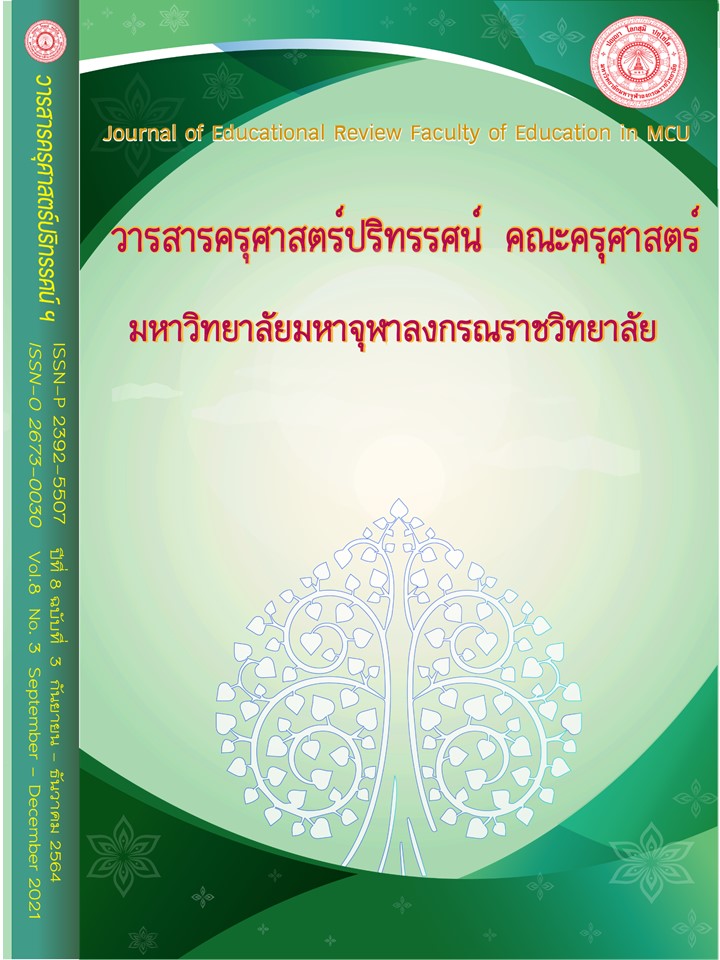MODEL OF BEHAVIOR DEVELOPMENT OF THE YOUTHS BASED ON SACCA PRINCIPLES FOR TEMPLES IN THAILAND
Main Article Content
Abstract
This research article aimed to propose a model of behavior development of the youths based on Sacca principle for temples in Thailand. Mixed methods research was designed, and there were three research steps consisted of: Step 1 Study the behavior of the youths based on Sacca principle. A questionnaire was used to collect from 380 samples of youths attending the moral camp program for youth in Thailand. The data were analyzed by statistical analysis which were percentage, frequency, mean, and standard deviation; Step 2 the model was developed by interviewing 10 key informants and focus group discussion with 10 experts. Data were analyzed by using content analysis; Step 3 propose a model, a model of behavior development of the youths based on Sacca principle for temples in Thailand. It was a research that can be applied to the participation of the “Bovorn” consisted of houses, temples, and schools, in order to drive the change in youth behavior with the truth to change youth behavior to be good, smart, and sustainable happiness. There were 4 components: Part 1 Introduction, which were 1) Environment, 2) Principle, 3) Objectives; Part 2 Model which were 1) Work system, 2) Management process, 3) The Trisikkha Youth Training Project; Part 3 implementation step which were 1) Structure,
2) Decision Making, 3) Assessment Approach; and Part 4 Conditions for success.
Article Details
ทัศนะและความคิดเห็นที่ปรากฏในบทความในวารสารฉบับนี้ถือเป็นความรับผิดชอบของผู้เขียนบทความนั้นเพียงผู้เดียว และไม่ถือเป็นทัศนะและความรับผิดชอบของกองบรรณาธิการ
กองบรรณาธิการขอสงวนสิทธิ์ในการคัดเลือกบทความลงตีพิมพ์และจะแจ้งให้เจ้าของบทความทราบหลังจากผู้ประเมินบทความตรวจอ่านบทความแล้ว
ต้นฉบับที่ได้รับการตีพิมพ์ในวารสารครุศาสตร์ปริทรรศน์ คณะครุศาสตร์ มหาวิทยาลัยมหาจุฬาลงกรณราชวิทยาลัย ถือเป็นกรรมสิทธิ์ของคณะครุศาสตร์ มหาวิทยาลัยมหาจุฬาลงกรณราชวิทยาลัย ห้ามนำข้อความทั้งหมดหรือบางส่วนไปพิมพ์ซ้ำ เว้นเสียแต่ว่าจะได้รับอนุญาตจากมหาวิทยาลัยฯ เป็นลายลักษณ์อักษร
References
นิทรา ฉิ่นไพศาล. (2557). กลยุทธ์การบริหารการพัฒนาคุณธรรมพื้นฐานของนักเรียนประถมศึกษาในโรงเรียนสังกัดสำนักงานคณะกรรมการการศึกษาขั้นพื้นฐาน. ดุษฎีนิพนธ์พุทธศาสตรดุษฎีบัณฑิต. มหาวิทยาลัยมหาจุฬาลงกรณราชวิทยาลัย.
ประเวศ วะสี. (2530). พระสงฆ์และศาสนิกชนจะกู้ชาติได้อย่างไร. กรุงเทพมหานคร: สำนักพิมพ์มูลนิธิโกมลคีมทอง.
พระมหาบุญเพียร ปุญฺญวิริโย (แก้ววงศ์น้อย). (2544). แนวคิดและวิธีการขัดเกลาทางสังคมในสถาบันครอบครัวตามแนวพระพุทธศาสนา. วิทยานิพนธ์พุทธศาสตรมหาบัณฑิต. มหาวิทยาลัยมหาจุฬาลงกรณราชวิทยาลัย.
พระศักดิ์ดา ฉนฺทโก (สุวรรณทา). (2558). รูปแบบการพัฒนาผู้เรียนเพื่อเสริมสร้างคุณลักษณะที่พึงประสงค์เชิงพุทธบูรณาการ. ดุษฎีนิพนธ์พุทธศาสตรดุษฎีบัณฑิต. มหาวิทยาลัยมหาจุฬาลงกรณราชวิทยาลัย.
วิทย์ วิศทเวทย์. (2542). ธรรมะศึกษาแห่งชาติ พ.ศ. 2542. แหล่งที่มา http://www.moe.go.th/ moe/th/home/main.php สืบค้นเมื่อ 6 ก.ค. 2562.
สำนักงานสภาพัฒนาการเศรษฐกิจและสังคมแห่งชาติ. (2560). แผนพัฒนาเศรษฐกิจและสังคมแห่งชาติ ฉบับที่ 12. แหล่งที่มา https://www.nesdc.go.th/ewt_news.php?nid=6420&filename=develop_issue สืบค้นเมื่อ 6 ก.ค. 2562.


